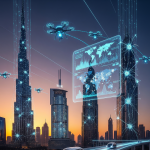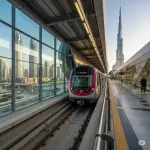The Roads and Transport Authority (RTA) has revealed how its groundbreaking Automated Railway Infrastructure Inspection System (ARIIS) is transforming metro maintenance and inspection, driving significant gains in efficiency, safety, and cost reduction.
The AI-powered robotic platform represents a new chapter in Dubai’s mission to lead in smart, sustainable infrastructure and artificial intelligence adoption. By automating traditionally labor-intensive processes, ARIIS is helping the city cut down inspection times, extend the life of its metro infrastructure, and optimise maintenance resources — all while enhancing commuter safety.
Inside the Technology
ARIIS is an autonomous robotic inspection system that combines artificial intelligence with advanced imaging and sensing technologies. The robot is fitted with high-resolution 3D cameras, laser scanners, and precision sensors designed to detect the smallest structural issues along metro tracks.
Unlike human inspection teams that require hours of manual effort, ARIIS operates during night-time maintenance windows. This allows it to conduct uninterrupted inspections without disrupting daytime passenger services. As it navigates through the network, the system continuously collects real-time data on track conditions, detecting wear and tear, cracks, and alignment deviations.
The collected data is then processed by AI algorithms capable of not only identifying current issues but also predicting future maintenance needs. This predictive approach enables the RTA to schedule proactive repairs and upgrades, preventing minor issues from escalating into major faults that could disrupt service or endanger safety.
Efficiency That Delivers Results
Since being rolled out, ARIIS has delivered tangible results for Dubai’s metro operations. Inspection times have decreased by an impressive 75 per cent, translating into a savings of around 1,700 man-hours. The RTA has also reported that manual inspection activities have been reduced by 70 per cent, significantly lowering dependency on human resources for repetitive tasks.
The system’s accuracy and speed of condition assessments have improved by 40 per cent, ensuring that maintenance teams can make more informed and timely decisions. Additionally, the real-time analytics provided by ARIIS have helped optimise the allocation of resources by 40 per cent, further boosting operational efficiency.
Financially, the smart robot has proven to be a cost-cutting tool as well. Routine maintenance expenses have fallen by up to 25 per cent, and emergency interventions — which are often more expensive and disruptive — have been significantly reduced.
Safety and Reliability for Commuters
The introduction of ARIIS is not only about operational efficiency; it is also a major step toward improving safety and reliability for passengers. By enabling earlier detection of potential issues, the system reduces the likelihood of unexpected breakdowns or service delays. For the millions of commuters who depend on the Dubai Metro daily, this translates into smoother, safer, and more reliable journeys.
All inspections conducted by ARIIS are carried out under stringent occupational safety standards, with central coordination ensuring smooth integration into existing metro operations.
What’s Next for ARIIS?
At present, ARIIS is being phased in across selected metro lines. According to the RTA, full deployment across the entire Dubai Metro network is expected once ongoing technical evaluations are complete.
Looking to the future, the authority is considering extending similar AI-based inspection technologies to other modes of public transport, including the Dubai Tram, provided the infrastructure is compatible. Such expansion would mark another step in Dubai’s broader ambition of becoming a world leader in artificial intelligence and smart city solutions.
With initiatives like ARIIS, Dubai continues to position itself at the forefront of AI-driven infrastructure management. By saving thousands of human work hours, optimising resources, and ensuring passenger safety, the system is setting new global benchmarks in urban transit innovation.










